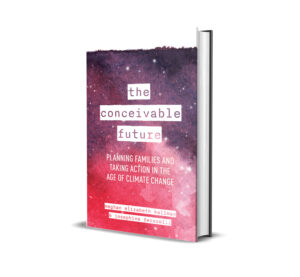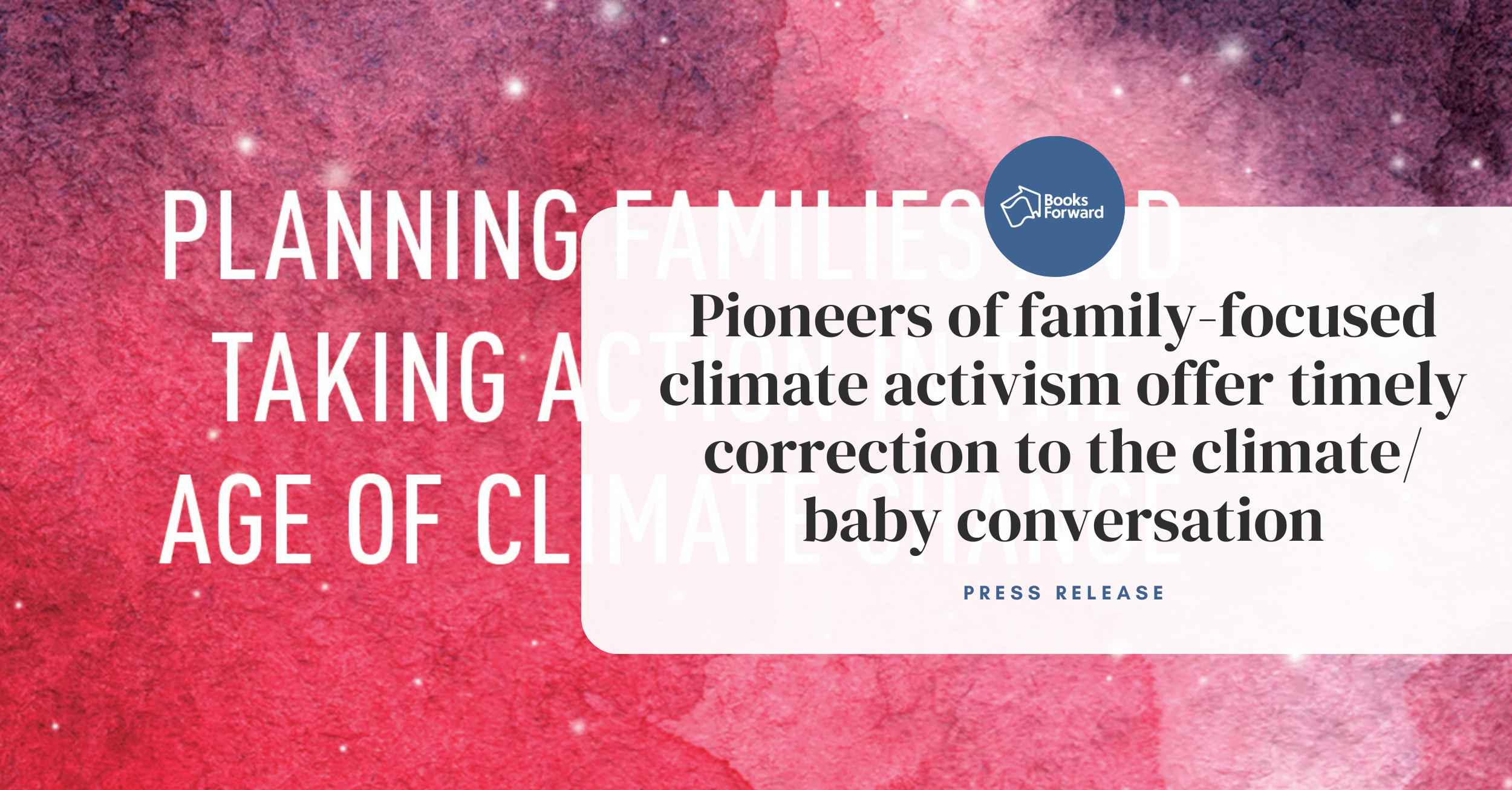 CHICAGO, IL & PAWTUCKET, RI– Co-authors Meghan Elizabeth Kallman and Josephine Ferorelli turned a decade of work with their organization, Conceivable Future, into a no-nonsense, compassionate guide for authentic family and political life amid the climate crisis. “The Conceivable Future: Planning Families and Taking Action in the Age of Climate Crisis” (Rowman & Littlefield, February 8th, 2024) is an empathetic, data-backed argument written in conversational prose that cuts through the noise to address how people, on an individual and collective level, can get politically involved to make the world safer for everyone’s children.
CHICAGO, IL & PAWTUCKET, RI– Co-authors Meghan Elizabeth Kallman and Josephine Ferorelli turned a decade of work with their organization, Conceivable Future, into a no-nonsense, compassionate guide for authentic family and political life amid the climate crisis. “The Conceivable Future: Planning Families and Taking Action in the Age of Climate Crisis” (Rowman & Littlefield, February 8th, 2024) is an empathetic, data-backed argument written in conversational prose that cuts through the noise to address how people, on an individual and collective level, can get politically involved to make the world safer for everyone’s children.
“The Conceivable Future” explores the ways in which the erosion of our planet impacts our personal decisions about family planning, parenting, and political action. This book offers fresh, timely insights to questions such as: How do I decide to have a baby when there’s the threat of environmental collapse? How do I parent a child in the middle of the climate crisis? What can I actually do to help stop global warming?
Kallman, a sociologist and Rhode Island State Senator, and Ferorelli, an activist and writer, offer both informed perspective and practical steps for taking meaningful action in combating the climate crisis, while also making smart, balanced decisions when it comes to starting and maintaining a family.
“The Conceivable Future: Planning Families and Taking Action
in the Age of Climate Change”
Meghan Elizabeth Kallman & Josephine Ferorelli
February 6th, 2024 | Rowman & Littlefield
Global Warming & Climate Change, Women’s Health, & Environmental Science
Print | 978-1-5381-7969-7 | $26.00
Praise for “The Conceivable Future”
“I know so many young people are trying to figure out what a burning world means for their most important choices…Now I’ll be able to send them this wonderful book, which manages to be both shrewd and kind; it understands on the deepest level that when we think of the world only as a series of individual decisions, those decisions become overwhelming, and that the only alternative is to build joyful and humane societies that work for all of us, including those who haven’t gotten here yet!”
–Bill McKibben, founder of Third Act
“Kallman and Ferorelli provide a compelling and compassionate framework for working though seemingly insoluble dilemmas, beginning with the decision to have a child, but not ending there. The book ends with a commonsense guide on how to make change happen.”
–Amitav Ghosh, author of “The Nutmeg’s Curse” and “Parables for a Planet in Crisis”
“This is a book full of feeling as much as politics; a rigorous, compassionate and empowering companion which holds its readers close while navigating the hardest of questions.”
–Brett Story, filmmaker, “The Hottest August” (2019)
“This book is like finding a friend when you are lost in a wilderness of despair and disinformation. With compassion, radical honesty, and humor, Kallman and Ferorelli guide us through one of the most heart-wrenching and necessary questions of our time: should we bring children into a world destabilized by climate crisis? The authors help us navigate uncertainty and find the collective will to change what’s possible.”
–Madeline Ostrander author of “At Home on an Unruly Planet: Finding Refuge on a Changed Earth”
“The climate crisis is a crisis of reproduction. Reproductive justice is climate action. Kallman and Ferorelli have created a guidebook for climate action that recognizes these realities, and which is fierce, funny, open-hearted and never prescriptive.”
–Meehan Crist, writer in residence in Biological Sciences, Columbia University
 MEGHAN ELIZABETH KALLMAN & JOSEPHINE FERORELLI: Meghan Elizabeth Kallman is a professor in the School for Global Inclusion and Social Development at UMass Boston, a state legislator, and climate organizer based in Rhode Island. Josephine Ferorelli is a writer, illustrator, and yoga instructor who makes her home in Chicago, Illinois. Together they have been friends, collaborators, and co-directors of Conceivable Future, the organization that birthed this book, for a decade.
MEGHAN ELIZABETH KALLMAN & JOSEPHINE FERORELLI: Meghan Elizabeth Kallman is a professor in the School for Global Inclusion and Social Development at UMass Boston, a state legislator, and climate organizer based in Rhode Island. Josephine Ferorelli is a writer, illustrator, and yoga instructor who makes her home in Chicago, Illinois. Together they have been friends, collaborators, and co-directors of Conceivable Future, the organization that birthed this book, for a decade.
Find out more about Meghan and Josephine at their website.
Follow Meghan & Josephine on social media:
Instagram: @conceivable.future | Facebook: @ConceivableFuture
Twitter: @ConceivableFut
In an interview, Meghan & Josephine can discuss:
- Why “The Conceivable Future” focuses on family planning as the heart of their environmental activism
- How to move beyond a focus on “should we be/not be having children?” toward real solutions
- Why a justice-based perspective is the pathway to healing
- The common myth that overpopulation is a keystone issue to our climate crisis
- How Kallman’s work as a climate activist informs her career as a Rhode Island State Senator
An Interview with
Meghan & Josephine
1. Your book stems from over a decade of work through your organization called Conceivable Future; how did that organization come to fruition? What made you two decide to transform that work into this book?
In 2014, we met at a mutual friend’s concert. We were both activists, feeling alienated and discouraged with climate activism. And we were both 30 years old at the time, so family planning decisions were starting to feel both more pressing and more impossible. Together we started what would become Conceivable Future, bringing young people together at house parties across the country for conversations about the reproductive crisis that is climate change, based on the idea that sharing stories can build strength and resolve, and can help create a framework for transformative action. We found that people badly needed to talk. And since then, research has emerged proving that these concerns–about how to care for the children we have, about whether to have a child or more children as the climate crisis continues to unspool–are global. As soon as we began facilitating this conversation, we could see it was a much bigger topic than can fit in a 2 hour meeting. The book expands on what we’ve heard, and learned, through ten years of our organizing work.
2. What is your view of global population? How do you address the misconception that overpopulation is a main contributor to our climate crisis?
Across the world, abusive, authoritarian population control efforts have attached legacies of trauma to the subject of reproduction. In the US alone, the reproductive rights of Indigenous women and women of color have been repressed by many governmental and non-governmental actors and by implicit and explicit policies for literally hundreds of years.
The history of population control is a transnational history of cultural elites deciding whose babies are desirable, and whose babies are to blame for any number of societal ills. That is not a world we want. The argument for reducing the human population as a way to reduce emissions feels compelling in its simplicity: more people means fewer resources, more hunger, more suffering, more pollution. By reproducing, the argument goes, poor people create their own poverty. By focusing on population size, Global North institutions, whether governments or NGOs, are absolved from both responsibility and nuance!
But not only does this approach obscure real solutions, it identifies the wrong problem. A 2012 study of global economic drivers of carbon emissions found “no relation between short-term growth of world population and CO2 concentrations. We need to be tackling the bad economic and political systems that create inequality and climate change, not policing people’s bodies and their reproduction.
We will never achieve a more just world by attempting to control people’s reproductive lives. We don’t get to justice by coercion or force. The future we are struggling for stands on a foundation of human rights, in which we share, celebrate, and defend full reproductive autonomy and self-sovereignty. This includes the right to have children, as well as the right not to have children.
3. How does The Conceivable Future provide an intersectional framework for those who are interested in learning and taking action about climate change?
As Conceivable Future invites people to join this highly personal and deeply political conversation, we recognize that these topics– of population, reproduction, and climate justice, and how they connect to who we all are– have different meanings for everyone, rooted in different histories of oppression and trauma. We honor your story. We advocate for self-determination, an inalienable right for ourselves and our communities. Everyone on the planet lives with the fossil fuel regime in different and interlocking ways, and those ways reflect our identities, histories, and experiences. What we know we have in common is our desire for a sustainable future for all families.
4. What is climate justice and why is it important to your work?
Everyone deserves to survive and thrive, but inequalities make the climate crisis more dangerous for some than for others. Climate justice begins with the understanding that some people and groups are feeling more negative impacts than others. For instance, dangerous fossil fuel infrastructure is more likely to be located in poor communities than wealthy ones. And so, real solutions to climate change put justice first. That means that risk and harm mitigation is well-planned and funded, and costs and benefits are equitably shared. It means that we, in our groups and institutions, take responsibility for our decisions so that past inequities are not exacerbated by climate change, but remedied through our responses.
5. What do you hope that The Conceivable Future will accomplish for readers?
We want readers to know that they’re not alone if they’re feeling anxious, frozen, and frightened about the climate-changing world, and their place in it. We want readers to feel less guilty (the problem is not you personally, but rather our institutions) and more inspired (we can fix the real problems!). We hope this book is a starting point for readers to get unstuck, and get ready for the struggle–and the adventure–of our lives. We’ve created a climate action playbook that takes readers from the micro (individual, internal, and interpersonal work) to the macro (collective action strategies) level of engagement. We offer strategies and guidance for living a balanced life of climate action.

A former award-winning journalist with national exposure, Marissa now oversees the day-to-day operation of the Books Forward author branding and book marketing firm, along with our indie publishing support sister company Books Fluent.
Born and bred in Louisiana, currently living in New Orleans, she has lived and developed a strong base for our company and authors in Chicago and Nashville. Her journalism work has appeared in USA Today, National Geographic and other major publications. She is now interviewed by media on best practices for book marketing.


